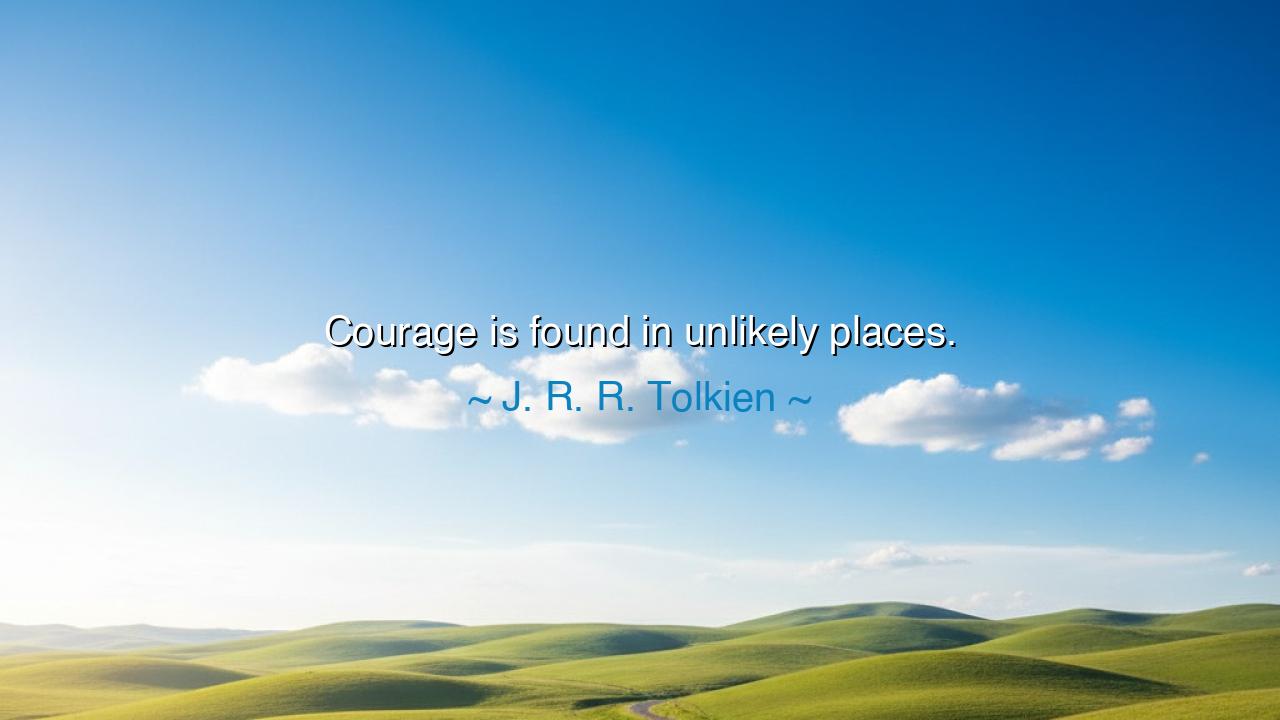
Courage is found in unlikely places.






In the immortal words of J. R. R. Tolkien, master of myth and maker of worlds, we hear a truth that resounds through the ages: “Courage is found in unlikely places.” These words, simple yet profound, are not born of fantasy alone, but of the deep wisdom of one who had seen both the beauty and the horror of life. For Tolkien, who walked through the mud and fire of the First World War, courage was not the privilege of the mighty, but the hidden jewel found in the hearts of the small, the weary, and the humble. His stories, woven from loss and hope, remind us that greatness often hides beneath simplicity, and that heroism does not always wear the crown of strength.
In The Lord of the Rings, this truth shines brightest through the hobbits, those gentle folk who love quiet meals and peaceful gardens more than battle and fame. When Frodo Baggins, a creature of no renown, accepts the task of carrying the One Ring into the heart of darkness, Tolkien reveals the essence of his philosophy: that the world’s fate often rests in the hands of the least expected. Frodo does not fight with sword or magic, but with endurance, humility, and heart. His courage is not loud — it is quiet, steadfast, and born of love. Thus, Tolkien teaches that courage is not the absence of fear, nor the possession of strength, but the will to act rightly when all seems lost.
Tolkien’s understanding of courage was forged in the crucible of war. As a young officer in the trenches of the Somme, he saw friends fall and nations crumble. The horrors he witnessed could have crushed faith and hope. Yet from that devastation, he drew a truth that became the soul of his work: that even amid the darkest of nights, light can arise from the most unexpected souls. The small act of a soldier shielding his comrade, the quiet endurance of those who carry on through despair — these became, to him, the truest form of valor. In a world obsessed with power, Tolkien’s words are a timeless reminder that courage is not measured by conquest, but by character.
Throughout history, this lesson has been revealed again and again. Consider the story of Rosa Parks, a quiet seamstress who, in 1955, refused to surrender her seat on a segregated bus in Montgomery, Alabama. She was no warrior, no politician, no giant of her age — yet her simple act of defiance sparked a movement that changed a nation. In her calm dignity, she embodied the very heart of Tolkien’s wisdom: that courage can dwell in ordinary souls who choose to do what is right, even when the world tells them to submit. The world remembers her not for grand speeches or riches, but for the still strength of her conviction.
And so it has always been — the unlikely have borne the torch of bravery. The farmer who stands against tyranny, the mother who protects her child amid chaos, the healer who walks into plague-stricken streets — these are the heroes who rarely find their names in the scrolls of history, yet they are the pillars upon which the world endures. Courage, as Tolkien saw it, is not a matter of birth or destiny, but of choice. It is a flame that can ignite in any heart, no matter how humble, if only that heart dares to stand firm in the storm.
Yet, there is a deeper truth still. Tolkien teaches us that the reason courage is found in unlikely places is because it is often born of love. The great do not always rise for glory; they rise for the sake of others — for friendship, for home, for the simple beauty of the world worth saving. In the face of fear, love gives strength to those who never believed they possessed it. Frodo walks into Mordor not for fame, but for the peace of all. Rosa Parks endured humiliation not for pride, but for justice. True courage, then, is the flowering of love in the soil of fear — the proof that goodness, even when fragile, is stronger than evil when it refuses to yield.
So, dear listener, let this truth be written upon your heart: do not measure yourself by size, strength, or station. Courage may already dwell within you, waiting to awaken. The challenges you face — in work, in family, in the quiet hours of doubt — are your proving grounds. You need not seek greatness; you need only choose what is right, again and again, even when it is hard. For in doing so, you join the long line of the unlikely brave, those who have carried hope through the ages.
And remember this: the smallest light can banish the deepest shadow. Tolkien’s wisdom is a beacon for all time — that in the unlikeliest of hearts, in the humblest of moments, the seed of courage may grow. When your time comes to act, act with love. When your heart trembles, hold firm. For though the world may forget the names of the mighty, it never forgets those who dared — quietly, humbly, and against all odds — to be brave.






AAdministratorAdministrator
Welcome, honored guests. Please leave a comment, we will respond soon